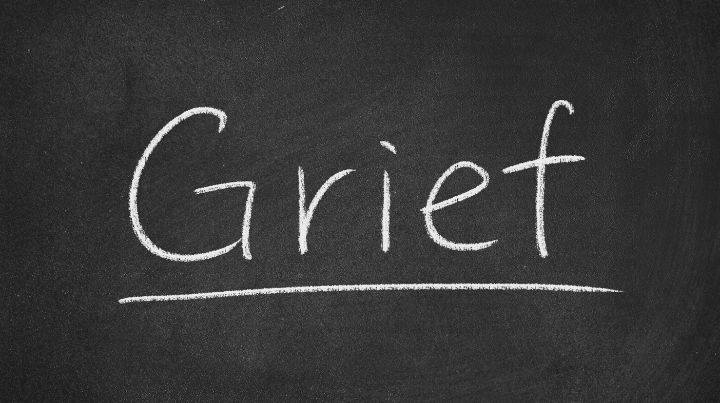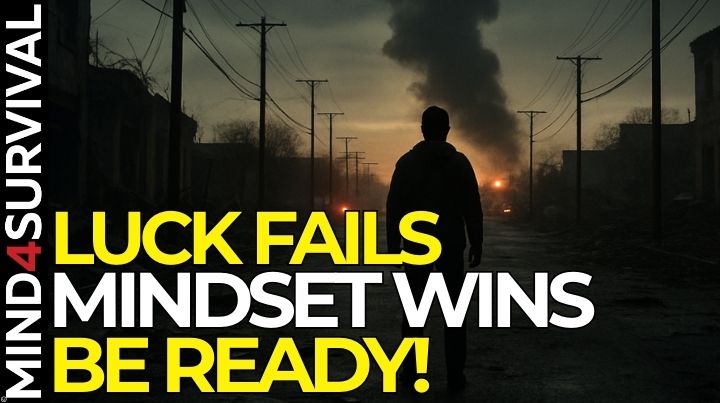162: Grief as a Force Multiplier


Podcast: Play in new window | Download
It's an ironclad fact that preparedness involves more than just the superficial tasks of physical preparation. It's also an unassailable fact that prepping must include mental and emotional preparation for one of the most debilitating aspects of disastrous times—grief.
Grief is important to understand because all of us will most likely struggle with the impact of grief at one or more points during our life. Additionally, I'd argue that as the potential for a more significant disaster increases, so too does our possibility of experiencing an increase in grief.
Therefore, it only goes to reason that if you are truly preparing to face disaster, you should, as part of your preparation, learn to recognize and deal with grief in yourself and others.
And that's precisely what this article is about, so read on!
Why is Understanding Grief Important for Preparedness
Unfortunately, as preppers, we often focus exclusively on physical preparedness, such as stockpiling supplies, creating emergency plans, and developing survival skills. However, mindset and emotional preparedness are just as important as physical preparedness, if not more so.
After all, we are less likely to put our physical preps to effective use during times of high consequence if we are a mental and emotional wreck. And, as a prepper, that's the last thing I want. Likewise, I doubt any of you want it, either.
Knowing what to expect with grief can help people recognize their emotional involvement and develop mechanisms to deal with it. It can also help us recognize when others are struggling with grief and, as a result, be as supportive as possible as they work through their grieving process.
What is Grief

Grief is part of the human condition and is a natural response to traumatic events such as loss. Because grief is part of the human condition, we are all subject to its effects.
Some of those effects manifest as sadness, anger, guilt, and confusion. Additionally, they can include physical symptoms like fatigue, insomnia, or loss of appetite. The intensity and duration of grief can vary widely among individuals, and it can last for weeks, months, or even years.
While grief is a challenging and often painful experience, it is an essential and normal part of the healing process. Grief cannot be avoided. However, by acknowledging it and understanding it and our emotions, we can gradually come to terms with our grief, find meaning in our experiences, and ultimately move forward in our lives.
What are the Five Stages of Grief
While everyone experiences grief differently, psychiatrist Elisabeth Kubler-Ross identified five stages that individuals commonly go through when grieving. These stages are commonly known as the Kubler-Ross model and include denial, anger, bargaining, depression, and acceptance.
Denial
The first stage of grief is denial. This is when individuals may feel numb or disbelieving regarding their situation. Denial is often the initial response to loss as individuals struggle to comprehend the situation's reality. It's common for individuals to feel that the situation isn't happening or that it's a mistake. During this stage, individuals may also experience shock, confusion, and emotional numbness.
An example of denial in the context of grief is when a person receives news of the death of a loved one and refuses to accept it. They may deny the reality of the situation and believe that it is not happening or that it is a mistake. They may cling to hope that the news is incorrect and continue to wait for more information or evidence to the contrary.
People in denial may also avoid talking about the situation or refuse to acknowledge their emotions, feeling emotionally numb or disconnected from the situation. This stage of grief can last for different periods of time. Some may move past it relatively quickly, while others may remain in denial for an extended period, inhibiting their ability to process and heal from their loss.
Anger
Once denial starts to fade, individuals may experience intense emotions and feel resentment towards the situation or others. This stage is known as anger, where individuals may lash out, blame others, or feel extreme frustration. Anger can manifest in various forms, such as irritability, hostility, or even physical aggression. It's essential to note that anger is a natural and healthy emotion, but it's important to express it in a healthy way and not to direct it toward others.
An example of grief's anger stage can be seen in a person who has lost their job due to unforeseen circumstances, such as a company downsizing. They may resent their employer, colleagues, or the situation and may lash out at them, blaming them for their current predicament. The person may become easily irritable, hostile, and even aggressive towards others, which can affect their personal and professional relationships.
In this situation, anger is a natural and healthy emotion, but it's important to express it in a healthy way that does not harm others or oneself.
Bargaining
In the bargaining stage, individuals may try to negotiate or make deals to avoid the situation's reality. It's common for individuals to feel they could have done something differently or made a different decision that could have prevented the problem. During this stage, individuals may feel guilt or regret and may bargain with a higher power or other individuals to try to change the situation's outcome.
An example of bargaining might be a person who has lost a loved one to cancer. During the bargaining stage, this individual may feel guilty about not doing enough to prevent their loved one's death, and they may think about what they could have done differently.
For example, they may tell God for their loved one's recovery, promising to be a better person, or that they'll do something in exchange for their loved one's health. The individual may also try to make deals with other people, such as promising to donate money to cancer research if their loved one recovers.
The bargaining stage is a typical response to grief and is an attempt to try to regain control and make sense of a difficult situation.
Depression
The depression stage of grief is where individuals may experience sadness, regret, or hopelessness. This stage can be the most challenging and prolonged stage of grief as individuals struggle to come to terms with the situation's reality. Individuals may feel a range of emotions, such as sadness, loneliness, or apathy. They may struggle with daily activities or experience physical symptoms such as tiredness, sleeplessness, or loss of motivation.
A person in the depression stage may experience intense sadness, feelings of isolation, and loneliness and may struggle with simple tasks such as getting out of bed in the morning. They may find it challenging to concentrate on daily activities, lose interest in hobbies or socializing, and experience physical symptoms such as fatigue, insomnia, or loss of appetite.
They may feel they have lost their purpose in life and struggle to find meaning in their day-to-day activities. This stage of grief can be challenging and prolonged, and individuals may need professional support or the support of loved ones to navigate this stage effectively.
Acceptance
The final stage of grief is acceptance, where individuals come to terms with the situation's reality and find ways to move forward. As time passes and they process their emotions, they may come to the acceptance stage, where they acknowledge the reality of their loss. Acceptance doesn't mean that they are happy or okay with the situation.
Instead, it means that they have come to terms with it and are ready to move forward. In this stage, the person may find ways to honor the memory of their loved one, such as by creating a memorial. They may also find meaning in the situation by helping others through a similar experience.
By reaching acceptance, the person can begin to rebuild their lives and move forward in a healthy way. Acceptance is a crucial stage in the grief process, as it allows individuals to find closure and meaning in their loss and to ultimately heal and move past the grief.
The Stages of Grief are Fluid
It's important to note that individuals may not go through the stages linearly or predictably, and some steps may be revisited multiple times. The length of time it takes to go through the stages of grief can vary depending on the individual and the situation. It can take weeks, months, or even years to complete all steps.
The crucial point to understand, though, is that the grieving process is part of the human condition, and because we are human, it's impossible to avoid. Moreover, because we are all unique humans, we all must go through it in our own way.
That does not mean we should let grief dominate us more than necessary. But that also does not mean we should expect NOT to struggle with grief when confronted with a situation that our version of the uncontrollable human condition determines requires grieving.
13 Situations That Cause Grief

Part of working through our grief is identifying when you or others are grieving and then giving those grieving the grace and support to work through what in their individual world is a difficult situation.
With that, one way to help us accept that we are in the grieving process is by recognizing that what we are grieving over is a grief-worthy situation. In my experience, grief-worthy situations typically include loss, change, and trauma.
Here are 13 examples of grief-causing situations:
- The loss of a loved one due to illness, accident, or other causes.
- The end of a significant relationship or friendship.
- The loss of a beloved pet.
- The loss of a job or significant financial setback.
- A disaster that results in the loss of property or destruction of your community. The loss of a home due to a fire, flood, or another natural disaster. The loss of a business or livelihood due to bankruptcy, theft, or other causes.
- The death of a public figure or community leader who had a significant impact on your life.
- Any event that results in significant changes in daily life, such as retirement and ending a career, becoming an empty nester, which can cause a loss of identity and purpose.
- Traumatic events, such as physical or emotional abuse, violence, or accidents.
- A significant personal setback, such as failing an exam or not achieving a goal. The loss of a dream or aspiration, such as a failed project or unfulfilled career goal.
- The diagnosis of a severe illness or chronic health condition.
- The diagnosis of a mental health condition, which can be overwhelming and stigmatizing.
- Living with high crime and instability due to social upheaval, war, or reasons beyond our control.
- Betrayal by a trusted friend or family member.
Why Does Understanding the Grieving Process, Matter?
Understanding the grieving process can be extremely helpful for a grieving person because it can provide a roadmap for what to expect during the grieving journey. From a preparedness point of view, understanding the driving process provides situational awareness of what to expect as you or others work through their grieving process.
When someone is grieving, they may experience a wide range of emotions that can be overwhelming and confusing. By understanding the typical stages of grief, such as denial, anger, bargaining, depression, and acceptance, we can recognize that what we and others are experiencing is normal.
In turn, that understanding helps us to empathize with the person struggling, even when the person working through grief is us. Empathy does not include being unrealistic with our expectations and telling those grieving, including ourselves, to “Suck it up. Life Happens. Get your crap together.”
While there may be a time and place for that, it's not the time and place simply because one person is tired of the other person's grieving. Something to think about is the possibility that when one person is grieving, the person who may be tired of them could also be in the grieving process. I'll let you figure out which phase they might be in.
Additionally, understanding the stages of grief can help us as individuals prepare for and manage difficult situations more effectively. By recognizing the emotions and behaviors associated with each stage, we can identify where we are in the process and develop coping mechanisms and strategies to manage our emotions more effectively.
Perhaps managing our grief-driven emotions more effectively means that, at a minimum, we recognize why we may be behaving in ways that don't match up with how we act when we're not grieving.
Maybe that means that we need to remind ourselves that we're:
- in denial, and while totally understandable, are not facing reality.
- in the anger stage and need to take a pause before we jump down someone's throat.
- trying to bargain for something that is unobtainable and should think twice before making rash commitments.
- naturally depressed and have to push ourselves to get things done.
- accepting of the situation, and at times we may backslide into the grieving process—and that's okay, simply because we're human.
How to Deal with Grief

Dealing with grief can be a challenging and complex emotional experience that can impact our mental and emotional well-being. However, there are ways to help ourselves and others through grieving effectively.
Below are six strategies that can be helpful:
- Allow yourself and others to grieve: Grief is a natural and necessary process, and it's essential to allow yourself and others the space and time to grieve. Suppressing or ignoring grief can prolong healing and cause additional pain and anguish.
- Communicate and connect with others: Talking about our feelings and experiences can be an effective way to process our emotions and find support from others. Communicating openly and honestly with trusted friends, family members, or mental health professionals is essential.
- Practice self-care: Taking care of ourselves physically, emotionally, and mentally is essential during the grieving process. This includes getting enough sleep, exercise, and nutrition, practicing relaxation techniques, and engaging in activities that bring us joy and comfort.
- Honor the memory of the person or thing that is lost: Finding ways to honor the memory of the person or thing that is lost can be an effective way to cope with grief. This can include creating a memorial, starting a charity, or participating in an activity that was significant to the person.
- Seek professional help when necessary: Grief can be a challenging and complex process, and sometimes, we may need additional support or guidance from mental health professionals. Seeking professional help can be a healthy way to manage grief and promote healing.
- Be patient and compassionate: Grief is not a linear process, and everyone experiences it differently. It's essential to be patient and compassionate with ourselves and others during the grieving journey.
How Does Understanding Grief Give Preppers an Advantage?
Knowledge is power. And in this case, situational awareness is power. Those who understand grief have an advantage when heading into difficult times.
Why? Because difficult times cause grief. Therefore, if we know that we will experience it, we can be on the eye for it. If nothing more than saying, “Hey, I just experienced one of the situations that cause grief. Therefore, I can expect to experience the five stages of grief. As such, I'm that much more on the ball to notice if I'm responding emotionally to my situation. And when I find myself responding emotionally in a manner that is effective, nor in the right alignment with the situation. In other words, am I being overly emotional? If so, I can work to dial myself in so that I am being effective and in the right alignment with what's happening.”
That is powerful. It's powerful because those who don't understand the role grief will play when facing adversity are more likely to suffer the negative effects of grief more significantly and for longer.
You, on the other hand, are now prepared to know what's happening with you and others in times of crisis. You also have a better idea of how to address it in a way that's better for your, your loved ones, and your situation.
And that is preparedness! That's why we do what we do!
The Bottom Line About Grief
Grief is a challenging and complex emotional experience that can arise from various situations, such as losing a loved one, natural disasters, etc. As preppers, it's essential to recognize that mindset and emotional preparedness are equally important as physical preparedness.
Understanding the stages of grief—denial, anger, bargaining, depression, and acceptance, can provide a roadmap for understanding where people are in the process and why they may be behaving the way they are. It also allows us to work on coping mechanisms and strategies to manage the situation and respond more effectively.
While many disregard or talk down on it, emotional resiliency is a significant part of preparedness because it directly impacts our effectiveness during high-stress situations. By prioritizing emotional resilience, preppers will not only be more in tune with our world, but we'll also increase our chances of survival during times of crisis and ultimately achieve the ultimate goal of preparedness—living our best possible life.
And that's what it's all about!
What are your thoughts and experiences with grieving and emotional resilience? Do you feel they have a place in preparedness?
Additional Resources
- Teach Children How to Face a Disaster Without Scaring Them
- Mental Fortitude: 7 Steps to Develop Mental Toughness
- 161: How to Manage Stress and Anxiety in Preparedness
- What is Post Traumatic Stress Disorder (My PTSD Battle)
Stay safe!

Related Articles
FREE Guide
Read the Best Seller
Join Mind4Survival
Stay informed by joining the Mind4Survival! 100% Secure! 0% Spam!
Affiliate Disclosure...
Mind4Survival is a free, reader supported information resource. If you make a purchase through our link, we may, at no cost to your, receive an affiliate commission.
Do You Want To Be Ready No Matter What?

Download our free 39-page guide with interactive, 7-Day Emergency Kit Checklist and take the first step toward real preparedness.
- Know exactly where to start.
- Save time and money.
- How-to build a complete Basic Emergency Kit.
- Level up your safety and security.
Join Mind4Survival
Stay informed by joining the Mind4Survival! 100% Secure! 0% Spam!






Thank you for making yourself so vulnerable by sharing such private grief. I know some people might make fun of someone grieving over “just a dog”… but such people have probably never truly loved a pet. Those who have realize that pets really do become like members of the family. And it sounds like your dog is extra special.
I am sorry for your imminent loss.
Rob, thanks for your kind words. I believe there’s a weirdly great thing about sadness and loss. Sadness, IMO, is a painful measurement of love. The more we love, the more pain and sadness we’re likely to experience.
Thanks again,
Brian
Thanks Brian. Just read the article on grace and empathy, which came at a perfect time. Time for me to reflect on my current situation and state of mind. Then I ran across this article, which also seems to align with my current situation. I lost my husband several (more than) years ago and find myself still in grief mode. After his death I went through all the stages, getting hung up in several stages more than others. In a survival situation, there can be compounding problems that seem to exaggerate some stages…death of a loved one, situation beyond our control, natural disaster. I found myself spiraling. I finally felt I was working through the acceptance stage. This week I lost my foundation, which was my dog that helped me get through all those things for years. He was a physical and mental support system. When I had heard you lost your dog, I was very saddened knowing what a support they are to us in good times and bad.
Thanks, Suzanne! I’m sorry to hear about your loss. It’s never easy. I am encouraged though to read that you are actively searching for answers and ways to work through your grief. Keep up the great work! ~Brian